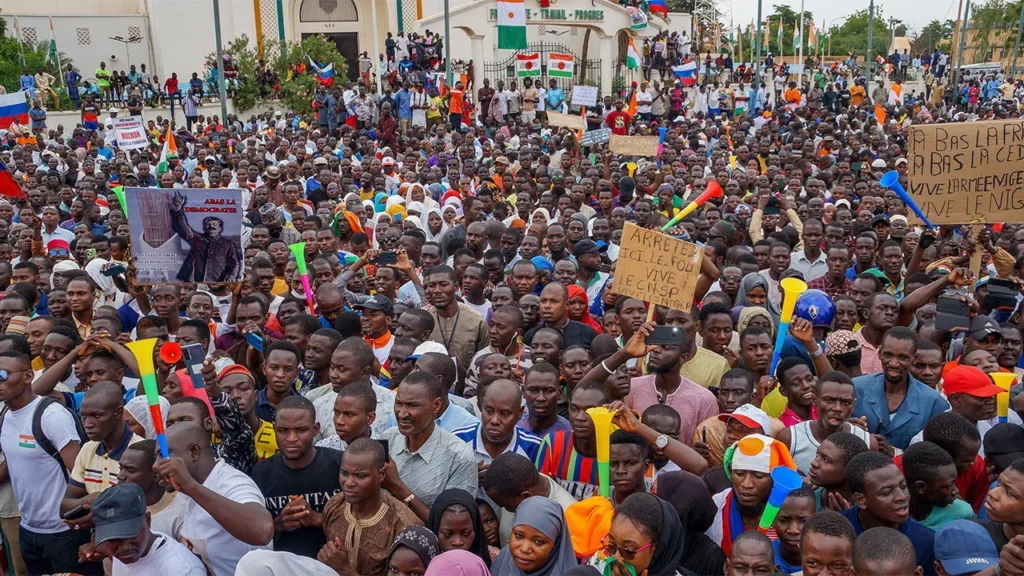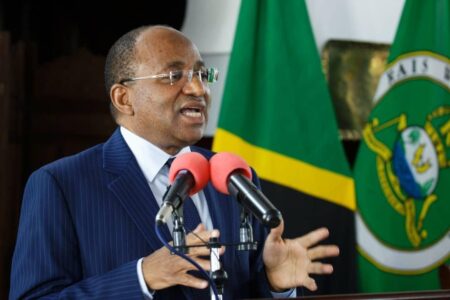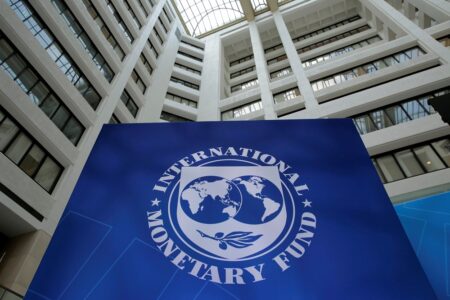- Months after the Military takeover in Niger, the African Development Bank (AfDB) forecasts the country’s GDP to jump by 11.2 per cent in 2024, following growth of 4.3 per cent in 2023.
- Niger has removed its military support agreements with the French and the US, respectively.
- Niger becomes the third country, following Mali and Burkina Faso, to experience a military takeover.
Growth projections after the Military takeover in Niger
“Imperialist France”, “Down with France”, and “Chani (name of the Niger coup leader)” are a few energetic words chanted by the thousands of supporters and demonstrators who demanded the French troops leave Niger.
The latter reflects what is now referred to by the military regime as a people-led democracy. The question that then arises is; Could Africa be experiencing a withdrawal period from the grim historical chains of its colonial era, particularly the Francophone nations, Niger to be exact? (colburnschool.edu)
“I have come here to demand the departure of French troops from Niger. That’s what I have come to demonstrate today,” a protester said as Niger scrapped every military cooperation and urged the security forces to exit the nation.
Over the past six months, Niger, a nation of nearly 27 million people with an estimated GDP of 6.9 per cent in 2023, has headlined global news due to its stark defiance of the West, the July 26, 2023 coup d’etat whose aftermath impaired its already faint economic growth.
Less than five months after the nation’s elected President, Mohamed Bazoum, was removed from office, the nation’s military Junta led by Gen Abdourahmane Tchiani has defied and changed an array of agreements in a bid to create a new Niger.
The deposed president, who France considered a crucial military partner, hinged the expertise and welfare of his nation on EU specialists who have trained Niger’s security forces for many years. Unlike Bazoum, The Junta have eliminated the accords.
Niger’s economic fate
The July 26 Coup brought so many challenges to Niger. The West African nation saw recurring power cuts, falling purchasing power, and food shortages: After seven months of Economic Community of West African States sanctions imposed after the coup, a recent report by Le Monde indicates that nothing in the streets of Niamey points that Niger could experience the highest growth rate in 2024.
The African Development Bank (AfDB) March report pointed out that the nation’s GDP could jump by 11 per cent in 2024, following growth of 4.3 per cent in 2023.
According to Le Monde’s report, these “growth forecasts assume a gradual return to normal,” which includes the “lifting of sanctions [effective since February 24] and the return of financing,” said the World Bank.
Further, they are also based on the assumption that 90,000 barrels of oil per day will be exported via the pipeline linking the Agadem oilfield to the port of Sèmè in Benin, which should generate around €610 million in tax revenues by 2025. Niger currently exports 20,000 barrels a day. On March 2, Chinese company CNPC, in charge of the project, announced the commissioning of the pipeline, enabling the first barrels to leave the country within two months.
Le Monde report also found that the growth forecast should be cautiously treated. This is according to economist Emilie Laffiteau, associate researcher at the Institute of International and Strategic Relations (IRIS).
“Niger is one of the poorest countries in the world. It’s always easier to create a growth peak when you’re starting from a long way off,” she said especially as the 11.2 per cent growth will not necessarily affect the country’s long-term development.
According to various World Bank and ADB reports, the country must carry out structural reforms and lean more toward the manufacturing and services sectors for the growth forecast to become a lasting reality.
As long as Niger has not embarked on industrialisation and is mainly dependent on its raw materials, the country will remain vulnerable to climatic shocks and price variations set by international markets.
Although service sector performance will have increased by 2022, according to the AfDB, it only accounts for a third of GDP. It’s a share that is likely to decline with oil extraction.
With political instability and regardless of the type of democratic takeover, Niger’s economic outlook remains uncertain as political crises tend to prolong, which mars progress by halting international projects and their related financing.
Read Also: Africa dominates the world’s 20 fastest-growing economies in 2024
Is West Africa Waking Up
Undoubtedly, the Junta has demonstrated a rather unique power takeover format in the region. Niger’s current military rulers opted for a radical change of policy, demanding its former partner, France, to pull out completely.
Same as Burkina Faso and Mali, Niger’s defiance comes at a time the region is reviewing and challenging preexisting ways of work its Western partners. The trio have demonstrated how military rule could be a possible way of restoring a civilian-led democracy.
The anti-french sentiments have been a growing pain for the trio, who have used it as a tool to ascend towards the helms of power. The latter has also brought a new wave of rebellion towards the regional economic bloc Economic Community of West African States (ECOWAS).
Whether the pressure of increased economic isolation or reduced development and security support, the former colonial power is an essential scapegoat.
Unlike the used mannerisms of power takeover, the Niger coup became a sight – as multiple crows marched through the streets of Niger’s capital, Niamey singing songs and showcasing placards supporting the nation’s self-declared new leader Abdourahmane Tchiani.
Many people in Niger find the current wave of political turn to be essential and an inevitable action towards achieving a fair and equitable economic progression.
“They (France) have been exploiting uranium here for almost 63 years, but we don’t have a damn that can produce electricity for Niger,” Issoufu, a Niger citizen, told Aljazeera.
The Niger national expects the new military regime will be of merit and foster better economic growth for the people.
However, the defiance is taken negatively by Western nations and within the region. According to information from Aljazeera, ECOWAS has imposed a host of sanctions against Niger, including a no-fly zone and border closures.
Shockingly, Niger’s neighbour Nigeria, which supplies the nation with 70 per cent of its electricity, cut off the power supply, forcing the nation into darkness.
Currently, Niger’s defiance has taken a new shift as the nation suspended its military agreement with the United States “with immediate” effect, according to the ruling military spokesman Colonel Abdramane.
The suspended agreement allowed US military personnel and civilian defence staff to operate from Niger, which is argued to be playing a central role in the US military’s operations in Africa’s Sahel region and home to major airbases.
The blow was a result of a breach of diplomatic protocol made by Assistant Secretary of State for African Affairs Molly Phee and US Africa Command head General Michael Langley, who visited Niger earlier this week to discuss democratic transition, according to Aljazeera.
A US official who spoke under anonymity to Reuters news agency said the officials had rather “frank discussions” in Niger’s capital, Niamey, about the trajectory of Niger’s ruling military council.











